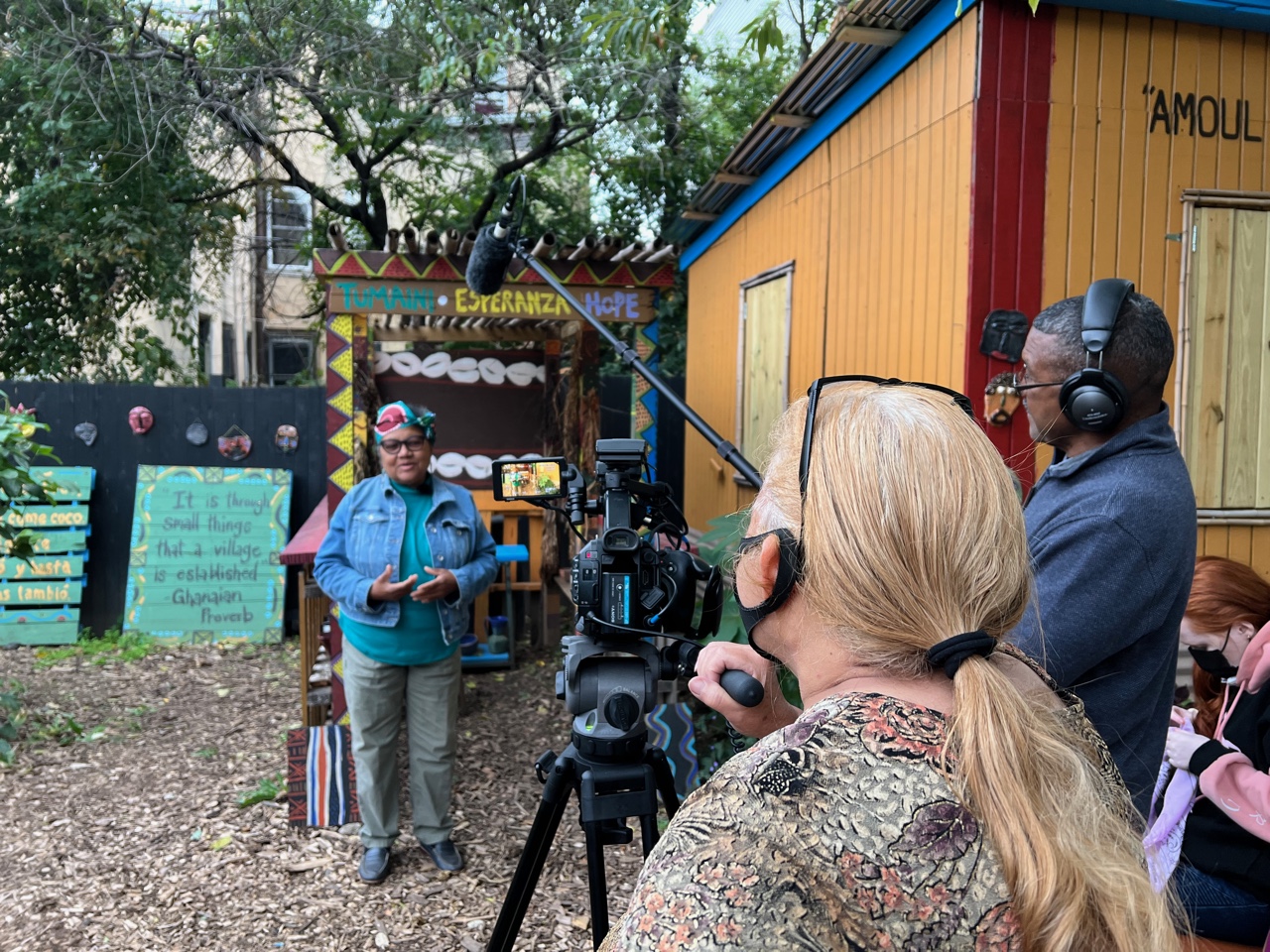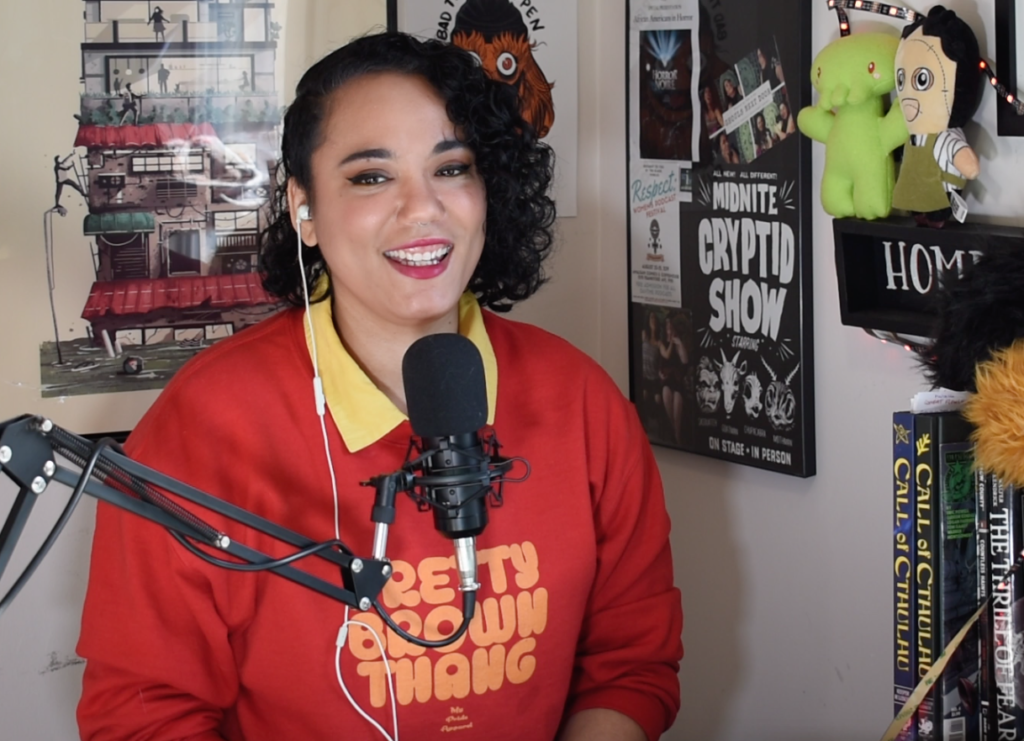
14 Mar Philadelphia Artist Spotlight: Anula Shetty
BY GABE CASTRO
This article was originally published on March 14, 2023. Updated March 17, 2023.
The cinéSPEAK Journal publishes a monthly Philadelphia Artist Spotlight highlighting local filmmakers and moving image artists doing unique and impactful work.
Anula Shetty is an award-winning filmmaker and new media artist. She is the founder of Fire Work Media, a media production company that uses Augmented Reality (AR), Virtual Reality (VR), and mobile apps to tell stories about the environment and marginalized communities. Shetty is a first-generation immigrant, drawn to stories about the immigrant experience, underserved communities, ethnic heritage, and what it means to be an “alien” in a foreign land. Her previous work includes the documentary Kamaka’eha (Aching Eye) (Grand Prize, U.S. Super8 Film Fest) and the narrative short Paddana, Song of the Ancestors (Best First Film, Mumbai International Film Festival).
Shetty is a member of the filmmaking collective Termite TV. Termite TV and Shetty believe in the power of storytelling through media to imagine new futures and inspire new ways of thinking.
Her recent work with Termite TV and filmmaking partner, Michael Kuetemeyer, Places of Power, use VR and AR technologies to amplify stories of marginalized communities in Philadelphia. The immersive experience engages audiences to explore questions about their community and its residents: how change affects them, but also how they can mobilize change. Last summer as part of her Leeway Media Artists and Activist Residency, Shetty and Kuetemeyer collaborated with Norris Square Neighborhood Project for their Villa Africana Colobo Garden event, which featured the Places of Power VR documentary about the neighborhood. They brought the community together to reflect on its past and celebrate its future through music, poetry, food, and dance. The duo sought to “document the urban gardens that celebrate African roots and African heritage in Puerto Rico, the U.S., and Africa. We…hear[d] stories of migration, color prejudice, and reclaiming heritage. By sharing these stories, the project…builds bridges across generations and across cultures.”
Termite TV is approaching their 30th Anniversary and to celebrate, they are curating an exhibition at Cherry Street Pier in April, available to audiences from April 7-April 23. The exhibit will be celebrating the past 30 years of Termite TV projects as well as new work created under the theme of “Portals.” Inspired by Arundhati Roy’s 2020 article that stated, “The pandemic is a portal,” the exhibit hopes to entwine Termite TV’s innate exploration of emerging and experimental visual language, using this to understand and reflect on our current political, social, and cultural moments. Instead of a “return to normalcy,” the collective hopes we’ll instead break from the mold and usher in a new world.
Shetty’s current project, Cosmic Egg, is a documentary about the desire for procreation. Set in Mumbai, India, it highlights the reproductive technologies of egg harvesting and transnational surrogacy as well as the long term physical and emotional impacts of these technologies. The film seeks to address the complexities of this industry from the intimate lens of Shetty’s personal struggle with infertility and the stories of women she meets in her journey.
cinéSPEAK asked Shetty about her filmmaking inspiration, what her work means to her, and how Philadelphia impacts that work.

cinéSPEAK: What inspired you to be a filmmaker?
Anula Shetty: As a child, I remember my dad telling us bedtime stories from Indian mythology. Other nights he would read us poetry. His words would conjure up these amazing worlds full of fabulous (and sometimes tragic) characters. I found myself getting attached to and deeply caring about these stories and characters. That was my first experience with the power of storytelling.
Growing up in India in the 80s, we only had one television channel and we eagerly devoured anything that was shown on it. Once a year they would screen all the films that were showing at the international film festival, and this was my introduction to the world of cinema and visual storytelling.
I later started realizing that mainstream media did not represent my experiences and the stories that were important to me. I wanted to see films about women’s lives, women’s conversations, women’s bodily cycles, and women’s daily rituals. This desire led me to make my first film, Paddana, Song of the Ancestors, a story of three generations of Indian women who live in a house inhabited by ancestral spirits.
cinéSPEAK: How did you get started on the Villa Africana Colobo Garden event? What are the themes of this work?
AS: As a first-generation South Asian immigrant, I feel a deep connection with the stories of the Puerto Rican immigrant community in Norris Square. I am drawn to the themes of place, home, identity, and hidden histories. I have worked and built relationships in the Norris Square neighborhood since 2003 when I first produced a documentary, Las Parcelas, for Scribe Video Center’s Precious Places Project. Since then, I have produced two documentaries about this neighborhood, Norris Square: Roots of a Community (2004) and Villa Africana Colobo: African Garden (2006).
I am excited to continue collaborating with Iris Brown (a community organizer, gardener, and dollmaker focusing on Puerto Rican heritage and art), the women of Grupo Motivos, and Norris Square Neighborhood Project as they celebrate their 50th anniversary and venture into a new phase of rejuvenating their urban gardens. Thanks to the Leeway Foundation Media Art and Activist Residency, Independence Public Media Foundation, Termite TV Collective, Philadelphia Latino Film Festival, and PhillyCAM for supporting this work.
I remember one of my first conversations with Iris Brown–she talked about how there are so many spaces in this city where, as a person of color, you are made to feel uncomfortable. She wanted to create a place in the neighborhood where people would feel comfortable, and where they would feel that they belonged. As an immigrant myself, I am constantly navigating these issues of belonging and searching for spaces where I don’t need to explain myself, and where I feel a sense of home. Iris’s vision resonated with me. In her work, I see myself and my own journey.

cinéSPEAK: How has Philadelphia shaped and influenced the process and/or content of your work? And what impact do you hope your work will have in the Philadelphia community?
AS: I love living in such a diverse and vibrant city, steeped in so much rich history! It is beautiful, messy, and complex all at the same time. The focus on community art and community building in Philadelphia is so inspiring. This is the place where I began to develop my creative and political voice.
I hope people are inspired by the story of Iris Brown, the women of Grupo Motivos, and the work of the Norris Square Neighborhood Project.
Follow Shetty on social media (@anulashetty) to keep up with her ongoing projects. You can also follow Termite TV collective to watch their newest project, Portals, unfold.
*Featured Image: Production still from Places of Power: Villa Africana Colobo Garden AR/VR Project. Photo credit: Michael Kuetemeyer and Anula Shetty, Termite TV Collective
Would you like to be featured in a future spotlight? Please fill out the Philadelphia Artist Spotlight form. The cinéSPEAK Journal maintains sole discretion over the publishing of any information provided via the form. Questions: journal@cinespeak.org

Gabe Castro is a Philadelphia-based Latiné multimedia professional specializing in the horror genre. Gabe believes media can be used as a tool to bring social change and works in all she does to create impactful and inspiring media.

Sorry, the comment form is closed at this time.